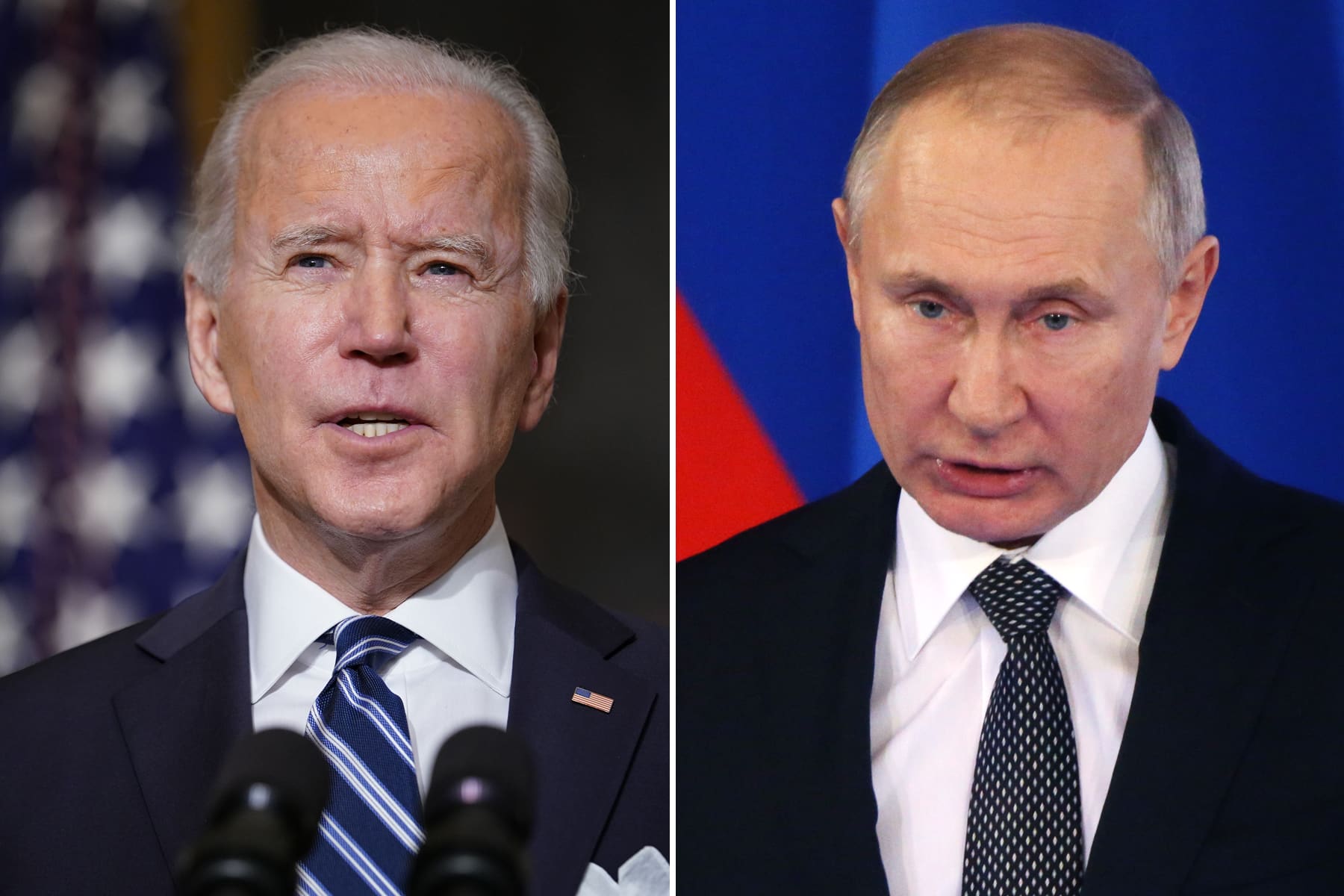
President Joe Biden (L) and President Vladimir Putin.
Getty Images
The Biden administration on Thursday imposed a series of new sanctions on Moscow for alleged interference in the 2020 elections, a colossal cyberattack on U.S. government and corporate networks, illegal annexation and the occupation of Crimea and human rights abuses.
“Today, the U.S. Treasury Department’s (OFAC) Office of Foreign Assets Control (OFAC) took strong action against 16 entities and 16 individuals who tried to influence the 2020 U.S. presidential election in direction of the Russian government, “the Treasury said. in a statement. He also announced sanctions on five people and three entities related to Russia’s occupation of the Crimean region of Ukraine and human rights abuses.
In addition to the extensive sanctions imposed by the Treasury, the State Department announced that it will expel ten officials from Russia’s diplomatic mission in the United States.
The sanctions come after President Joe Biden’s phone call this week with Russian leader Vladimir Putin, and when Russian force rallied near the border with Ukraine.
Washington formally accused Russia’s Foreign Intelligence Service (SVR) of being behind the advertising cyberattack SolarWinds late last year, described by cybersecurity experts as one of the largest hacking operations and sophisticated of history.
“The U.S. intelligence community has great confidence in its assessment of the attribution,” the Treasury statement said. The hack allowed hackers to gain access to software used by thousands of government offices and companies.
The sanctions also respond to a March report by U.S. Director of National Intelligence that concluded that Russian President Vladimir Putin authorized attempts to interfere in the 2020 election in favor of the former president. Donald Trump.
The Russian government denies all allegations.
Biden also signed an executive order on Thursday allowing Washington to sanction any sector of Moscow’s economy, significantly expanding the scope of sanctions authorities.
Under this new authorization, US financial institutions are prohibited from conducting transactions in the primary market for new bonds denominated in rubles or not issued after June 14.
“The president signed this new authority to deal with Russia’s continuing and growing malicious behavior,” Treasury Secretary Janet Yellen said in a statement applauding the measure.
“The Treasury is taking advantage of this new authority to impose costs on the Russian government for its unacceptable conduct, including limiting Russia’s ability to finance its activities and targeting Russia’s malicious and harmful cybernetics,” he added.
Worsening US-Russia relations
Adopting a tougher stance against Russia was one of Biden’s foreign policy campaign commitments. The measures announced Thursday join a number of past moves: the Obama administration’s debt financing restrictions for major Russian companies such as Rosneft and the Trump administration’s ban on US lending institutions government in foreign currency of Russia.
“Today’s US sanctions continue the general trend of worsening relations since the annexation of Crimea,” Maximilian Hess, head of political risk at the London-based law firm Hawthorn, told CNBC Advisors.
“The key part” of these sanctions, he said, “is the ban on US primary market entities for ruble-denominated debts by the Russian government.”
However, Hess noted, this “will not have a significant impact, especially given Russia’s manageable debt burden.”
For Timothy Ash, Bluebay Asset Management’s chief emerging market strategist, the measures are far from harsh.
“It’s like guys, wow, you have to do better than that,” Ash wrote in a note after the announcement.
“Sovereign primaries still allow US institutions to maintain this debt. Therefore, US institutions cannot buy Russian sovereign debt in the primary issue, but can get their friends from Russian banks to buy them at the primary ones, give them a commission and buy them in the secondary one “.
The ruble reduced some of its day’s losses against the greenback shortly after news of the sanctions, trading at $ 76.3025 at 16.00 local time compared to 77.0718 just before the details of the sanctions.
Accumulation of Russian troops on the border with Ukraine
Biden-Putin’s call on Tuesday, at least the second between the two men since Biden took office in January, comes as the United States and other Western countries tire of Russia’s growing military buildup throughout its history. border with Ukraine, where it has accumulated tens of thousands of troops and tanks.
“We are now seeing the largest concentration of Russian forces on Ukraine’s borders since 2014,” Secretary of State Antony Blinken said on Tuesday after visiting NATO headquarters in Brussels. “This is a deep concern not only for Ukraine, but for the United States.”
Regional experts say this move could be an attempt to test Biden’s bravery and intimidate Ukraine; the most pessimistic outlook suggests that its goal is to incite Ukraine to a renewed conflict.
Biden in the phone call with Putin “stressed the unwavering commitment of the United States to the sovereignty and territorial integrity of Ukraine,” according to a White House text.
Biden proposed holding a summit somewhere outside the US and Russia “to discuss the full range of issues facing” countries.
The Kremlin said Tuesday in a statement that Biden had “suggested considering holding a personal meeting at the summit in the foreseeable future.”